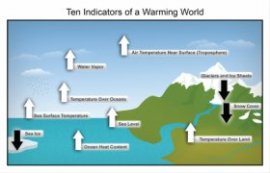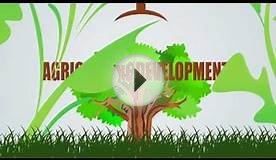Info about climate change
 According to the third U.S. National Climate Assessment, “Global climate is changing and this is apparent across the United States in a wide range of observations. The global warming of the past 50 years is primarily due to human activities, predominantly the burning of fossil fuels.”
According to the third U.S. National Climate Assessment, “Global climate is changing and this is apparent across the United States in a wide range of observations. The global warming of the past 50 years is primarily due to human activities, predominantly the burning of fossil fuels.”
Mandated at least every four years by the Global Change Research Act of 1990, the U.S. National Climate Assessment documents climate change related impacts and responses for various sectors and regions, with the goal of better informing public and private decision making at all levels.
Third U.S. National Climate Assessment Key Findings
- Global climate is changing and this is apparent across the United States in a wide range of observations. The global warming of the past 50 years is primarily due to human activities, predominantly the burning of fossil fuels.
- Some extreme weather and climate events have increased in recent decades, and new and stronger evidence confirms that some of these increases are related to human activities.
- Human-induced climate change is projected to continue, and it will accelerate significantly if global emissions of heat-trapping gases continue to increase.
- Impacts related to climate change are already evident in many sectors and are expected to become increasingly disruptive across the nation throughout this century and beyond.
- Climate change threatens human health and well-being in many ways, including through more extreme weather events and wildfire, decreased air quality, and diseases transmitted by insects, food, and water.
- Infrastructure is being damaged by sea level rise, heavy downpours, and extreme heat; damages are projected to increase with continued climate change.
- Water quality and water supply reliability are jeopardized by climate change in a variety of ways that affect ecosystems and livelihoods.
- Climate disruptions to agriculture have been increasing and are projected to become more severe over this century.
- Climate change poses particular threats to Indigenous Peoples’ health, wellbeing, and ways of life.
- Ecosystems and the benefits they provide to society are being affected by climate change. The capacity of ecosystems to buffer the impacts of extreme events like fires, floods, and severe storms is being overwhelmed.
- Ocean waters are becoming warmer and more acidic, broadly affecting ocean circulation, chemistry, ecosystems, and marine life.
- Planning for adaptation (to address and prepare for impacts) and mitigation (to reduce future climate change, for example by cutting emissions) is becoming more widespread, but current implementation efforts are insufficient to avoid increasingly negative social, environmental, and economic consequences.

